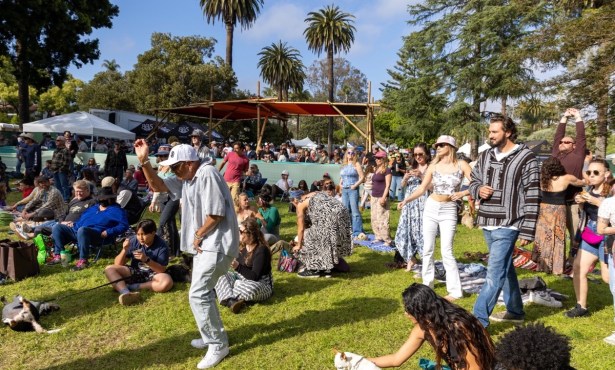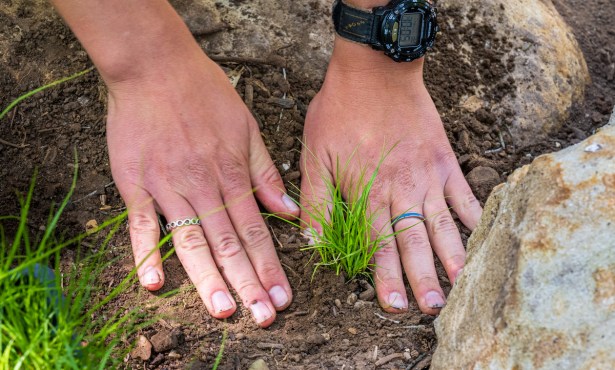Father Recalls Drowned Child’s Life
Oded Gottesman Gives Emotional Testimony in Civil Trial
Before Yoni Gottesman drowned in August 2005 in the Cathedral Oaks Athletic Club swimming pool, he was the most popular child at his synagogue, bilingual in both Hebrew and English, a budding musician, and the glue that held his family together-all at the mere age of four.
At Anat and Oded Gottesman’s civil trial against the Cathedral Oaks club owners and employees they allege are responsible for their son’s death, the jury was presented Monday with tearful testimonies from those who knew Yoni, who told the jury the boy was an unusually bright and charismatic toddler.
While much of the previous testimony has focused on what happened the day the young boy died, the Gottesmans’ attorney Barry Cappello spent Monday questioning witnesses about Yoni’s personality, hobbies, and the emotional impact of his death. While 10 of the 11 defendants admitted to negligence just prior to the start of the trial, the jury will have to determine damages owed for that. Judge Thomas Anderle posted a slide for the jury explaining that, in assessing non-economic damages, jurors must not award any compensation for suffering of the plaintiffs or by Yoni.
However, several witness testimonies from the day suggested that many people in the community were negatively impacted by Yoni’s death, in addition to his family. Cathedral Oaks’ role in Yoni’s death was not discussed until the end of the day, when Oded Gottesman testified with a dramatic account of how he discovered, after several confusing responses from Cathedral Oaks staff, that his son was dying.
Cappello began questioning Oded Gottesman by vaguely alluding to a promise that the father had made his son. On August 10, 2005, Gottesman received a phone call from a Cathedral Oaks staff member saying that Yoni had a seizure by the pool. But Gottesman claimed the woman’s tone was so casual that he thought she said that Yoni had stitches. Upon arrival at the center, Gottesman said that a staffer instructed him on where to park. The staffer didn’t show any sign of anything unusual, he said, but he began to panic when he saw an ambulance in the parking lot.
No one would tell him what happened and an officer would not allow him to approach the ambulance, instead instructing Gottesman to follow the ambulance to the emergency room in his own car. Gottesman said that he did not receive a straight answer about what exactly happened to Yoni until he talked to the paramedic crew in the emergency room. He said the crew was shocked that no one had told him anything. According to Gottesman, the crew said that they had been given misinformation about what had happened to Yoni and that he had been at the bottom of the pool. “Something wrong is going on,” he quoted the paramedic crew as saying. After spending almost an hour trying to revive Yoni’s lifeless body, a doctor explained that nothing was working and asked the father for permission to stop.
At least two jurors were openly crying by the time a shaky-voiced and tearful Gottesman reached the climax of his story, in which he approached the bed and made a promise to his son, the same promise mentioned by Cappello earlier in questioning: “I’ll do everything possible to find out what these people did to you.” Yoni had been floating at the bottom of the pool for eight minutes, which confused his father because the boy had taken swim lessons at the YMCA. The boy was able do the dog paddle and swim short distances without his life vest. His father was impressed with the meticulous attention paid by YMCA lifeguards, and he assumed that the Cathedral Oaks club’s summer camp would hire even better lifeguards, due to the higher cost of club membership.
Witness Anita Sonquist, who runs an infant day-care center in her home, said, “Yoni was the most happy, loving child there was.” Sonquist had provided care for Yoni until he turned two, but despite his young age, Sonquist was instructed to speak English to him. The Gottesmans spoke Hebrew to Yoni at home, and, according to Sonquist, the parents wanted Yoni to become fluent in both languages.
Cantor Mark Childs of B’nai B’rith testified that his son, along with many other children from the synagogue, would not attend services unless they knew that Yoni would be there, too. Denise Mabardi, a teacher at a Montessori school who had Yoni in her class from 2003 to 2005, presented Yoni as an energetic and outgoing child who attracted friends of all ages. The boy’s father said that his inbox was flooded with emails from strangers after Yoni died. “At some point, I realized more people in Santa Barbara knew me as Yoni’s dad,” Gottesman said, as opposed to any accomplishments of his own.
Gottesman was especially animated when he discussed Yoni’s interest in music. He had bought the boy a ukulele and two drum sets and proudly described his son’s skills as a video of Yoni playing drums flashed on the projector. Gottesman said that Yoni “was like the glue of the family,” and that he and his wife, who have three other children, two of whom were born after Yoni’s death, will never recover from the loss.
Anat and Oded are both Israeli immigrants, but Cappello made sure to highlight the couple’s contributions to American society in his questioning. Oded Gottesman received a PhD from UCSB while Anat Gottesman received a bachelor’s degree from the Southern California Institute of Architecture. Cappello asked Oded to explain the nature of his company, Compandent Technologies, which has developed products for the National Security Agency.
Monday’s court time ended before defense attorneys had a chance to cross-examine Gottesman. The trial will continue Wednesday.



